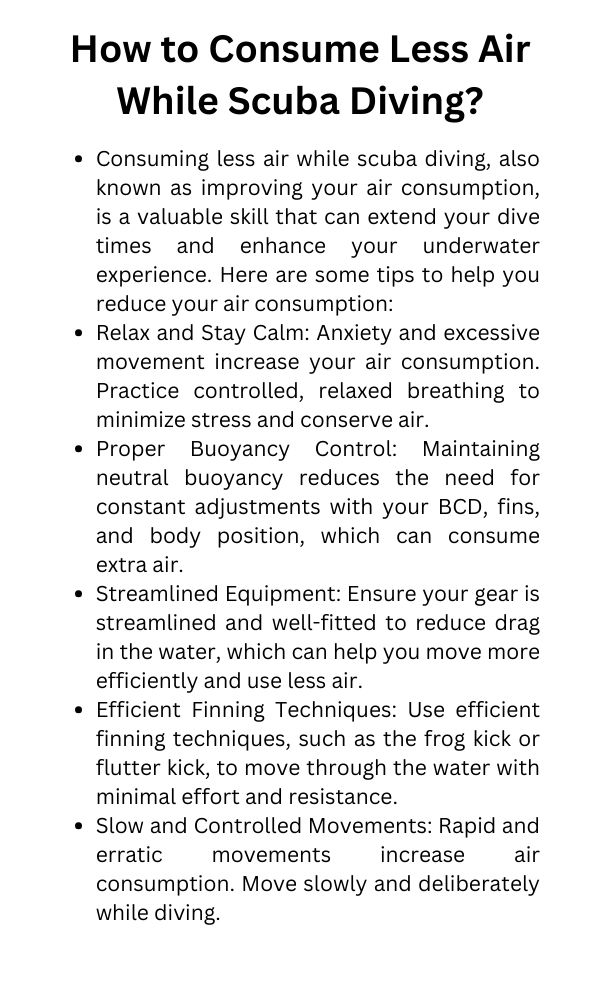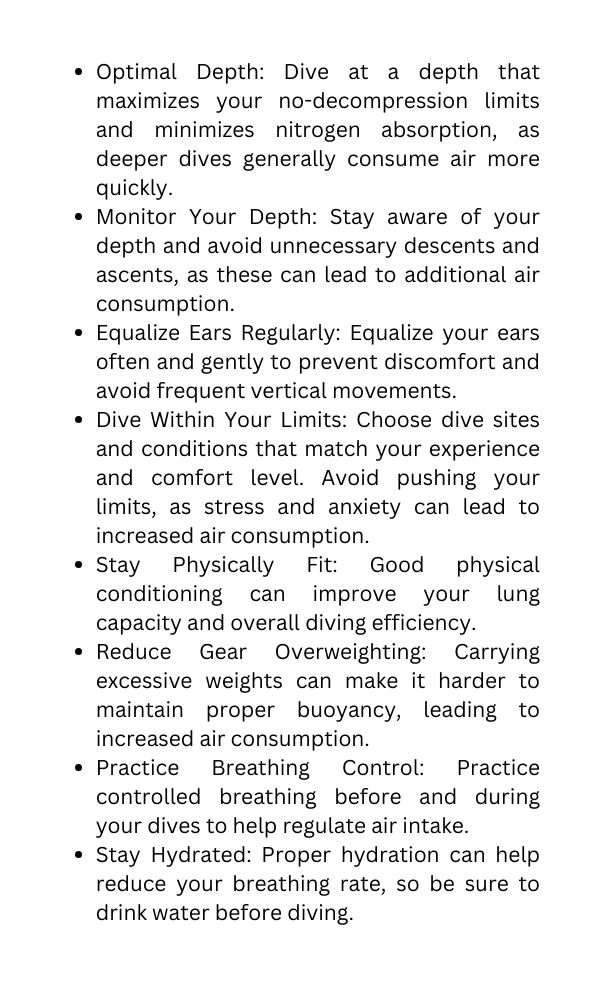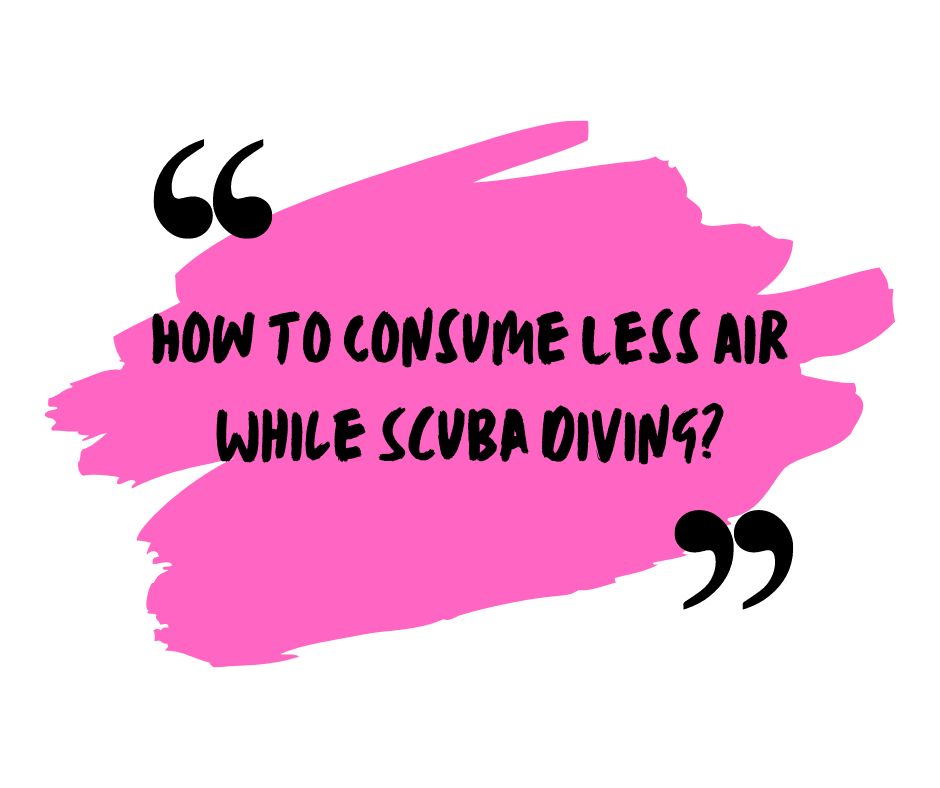Scuba diving offers a unique opportunity to explore the wonders of the underwater world. However, one common concern for divers, especially those new to the sport, is how to make the most of their air supply. Consuming less air while scuba diving not only allows for longer dives but also contributes to a more environmentally responsible approach to diving. In this article, we will discuss techniques and tips to help you Consume Less Air While Scuba Diving.
How to improve air consumption while diving?
1. Buoyancy Control
Achieve Neutral Buoyancy
Proper buoyancy control is one of the most critical factors in conserving air. When you are properly weighted and can achieve neutral buoyancy, you use less energy and air to maintain your position in the water column. Practice controlling your buoyancy and trim to stay level, which minimizes the need for constant adjustments.
Streamlined Diving
Reducing drag in the water is essential. A streamlined body position and equipment configuration help you move more efficiently. Ensure your equipment, like hoses, gauges, and accessories, is secure and streamlined to minimize resistance and save energy.
2. Breathing Techniques
Slow, Deep Breaths
Practice slow, deep
breathing while diving. Rapid and shallow breaths consume more air than slow, deep ones. Focus on inhaling and exhaling slowly and deeply, which not only conserves air but also helps you stay relaxed and in control.
Breath Control
Learn to control your breathing rate. Avoid rapid, panicked, or heavy breathing, as this can quickly deplete your air supply. Concentrate on rhythmic, controlled breaths that match your exertion level. For example, when swimming against a current or ascending, take slow, deep breaths to stay calm and minimize air consumption.
3. Equipment Considerations
Choose the Right Regulator
Select a high-quality, well-maintained regulator. A good regulator reduces breathing resistance, making it easier to breathe and consume less air. Ensure your regulator is serviced regularly to maintain its efficiency.
Use a Low-Pressure Inflator
When inflating your buoyancy control device (BCD), use short, controlled bursts of air instead of holding the inflator down. This prevents over-inflation and air wastage. Mastering the art of precise buoyancy control with small adjustments can significantly reduce your air consumption.
4. Physical Fitness and Relaxation
Maintain Physical Fitness
Being physically fit can make a substantial difference in air consumption. Regular cardiovascular exercise and strength training improve your lung capacity and stamina. This, in turn, allows you to breathe more efficiently while diving.
Stay Relaxed
Stress and anxiety can lead to increased air consumption. Practice relaxation techniques, such as visualization and meditation, to stay calm underwater. Additionally, experience and familiarity with diving conditions can reduce anxiety, helping you breathe more naturally.
5. Dive Planning
Plan Your Dive
Thorough dive planning is crucial for air conservation. Know your dive site, the depth, and the expected duration of your dive. Plan your descent and ascent carefully to minimize unnecessary air usage.
Monitor Your Dive Computer
Use a dive computer to keep track of your depth and bottom time. Many dive computers also display your air consumption rate, helping you stay aware of your air supply. Adjust your dive profile accordingly to ensure you have enough air for a safe ascent.


FAQ
Is it essential to dive with a buddy to conserve air?
While diving with a buddy is essential for safety, it may not directly impact your air consumption. However, having a buddy can provide emotional support, which can help reduce stress and, in turn, lead to more efficient breathing.
Can the type of tank affect air consumption?
The type of tank can influence air consumption to some extent. Smaller tanks will naturally have less air, so divers using smaller tanks may need to be more conservative with their air consumption. However, tank size is typically determined based on the dive plan.
How long does it take to become proficient at conserving air while scuba diving?
Becoming proficient at air conservation varies from diver to diver. With practice, most divers can learn to conserve air effectively within their first year of diving. The key is to continue practicing the techniques and staying calm underwater.
In conclusion, conserving air while scuba diving is a skill that improves with practice and experience. By focusing on buoyancy control, breathing techniques, equipment considerations, physical fitness, relaxation, and thoughtful dive planning, you can maximize your underwater time and enjoy longer, more efficient dives while respecting the environment and your own safety.
